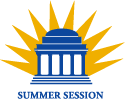| |
 |
|
|
|||
Summer Session 2001Germanic LanguagesDEPARTMENTAL REPRESENTATIVE: Dr. Richard Alan Korb, 311 Hamilton Language courses are not open to auditors. GermanGerman S1115D. Accelerated elementary reading, I and II. This accelerated survey of German grammar, reading techniques, and dictionary skills is designed primarily for graduate students preparing for reading proficiency exams or wishing to do research in German-language literature. Extensive exercises in translation, reading for general comprehension, and specialized reading are based on texts drawn from the students’ fields of study. Although this course does not satisfy any part of the foreign language requirement for degree candidates, successful completion of the translation on the final exam fulfills the German reading proficiency requirement in most graduate programs. Graduate fellowship students registering for the Columbia University Residence Unit in fall 2001 should check with the Graduate School of Arts and Sciences Financial Aid Office, 107 Low Library, for information regarding summer tuition credit. German S1121D. Intensive elementary German, I and II. Graduate fellowship students registering for the Columbia University Residence Unit in fall 2001 should check with the Graduate School of Arts and Sciences Financial Aid Office, 107 Low Library, for information regarding summer tuition credit. German S1201D. Intermediate German, I. German S1521Q. Intermediate German conversation, I. YiddishThe Uriel Weinreich Program in Yiddish Language, Literature, and Culture offers peerless instruction in Yiddish language and an in-depth exploration of the literature and culture of Eastern European Jews and their descendants throughout the world. The core of the program is an intensive 3-credit language course (9 a.m.‚12:30 p.m., Monday through Friday) at one of four levels, designed to develop proficiency in speaking, reading, and writing, as well as cultural literacy. As an essential complement to the morning course, students attend Yiddish conversation classes, workshops, and lecture series (1:30‚6 p.m., Monday through Thursday). In addition, there are related excursions and social events on some evenings and weekends. The intensive nature of the program precludes employment or enrollment in other courses. Because the program is offered in conjunction with the Max Weinreich Center for Advanced Jewish Studies of the YIVO Institute for Jewish Research, students have the opportunity to explore YIVO's Library and Archives, one of the world's major collections of materials for the study of East European and American Yiddish culture. Elementary-level students with no reading or writing knowledge of Yiddish must attend a day-long reading skills workshop on Sunday, June 24. For students wishing to enroll in the intermediate level or above, attendance in a two-week review sessionóTuesday, June 12, through Friday, June 22óis strongly recommended. Registration for intermediate and advanced levels requires prior permission from the director. How to ApplyFor a detailed brochure and application form, contact: Yankl Salant, Director (212) 294-6138 E-mail: [email protected] Partial scholarships are available. Those wishing to apply for a scholarship should request the additional application and send the completed form with supporting materials to Mr. Salant at YIVO by March 21, 2001. To register for the courses listed below, apply directly to YIVO at the address above, NOT to Columbia. Yiddish S1111R. Elementary Yiddish. Yiddish S1131R. Intermediate Yiddish, I. Yiddish S1132R. Intermediate Yiddish, II. Yiddish S3201R. Advanced Yiddish. Noncredit Language CoursesCertain language courses may be taken on a noncredit basis for $1,100 each, plus any course fees noted in the departmental listing. Students taking noncredit courses are held to the same standards as regular students with regard to:
Noncredit students who fail to meet these requirements may be asked to leave the course. Under no circumstance are these courses convertible to credit, except payment in full for the credit option before the designated last day to exercise the pass/fail option. No qualitative grade(s) are assigned or recorded. Students are assigned the mark of R (registration) for the courses they complete; a University transcript bearing that mark may be issued at the student's request. Call numbers for these courses (needed for registration) will be available after April 3.
|
|||
